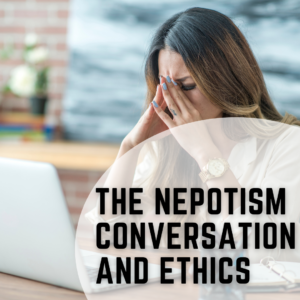 Fortune magazine (April 5, 2023) has raised an issue that has plagued organizations for years: nepotism. Many of us have been there and as a business ethics keynote speaker, business ethics consultant and book author it disturbs me that despite “enlightenment,” the problem is growing worse, not better.
Fortune magazine (April 5, 2023) has raised an issue that has plagued organizations for years: nepotism. Many of us have been there and as a business ethics keynote speaker, business ethics consultant and book author it disturbs me that despite “enlightenment,” the problem is growing worse, not better.
Who are you, exactly?
The conversation has taken on new life through (of course) social media and the broader issue of Gen-Z. It started when it was revealed just how many popular movie stars are sons and daughters of movie stars. I don’t know why anyone should be surprised at this for it has occurred for generations. Apparently, sensibilities of fairness were raised as a result of this issue. Parents want the best for their kids and I understand that, but in the larger context the trend in ethically disturbing. It has also led to a good dosage of hypocrisy.
Gen Z, the up-and-comers, take exception to nepotism. In fact, research shows that 75-percent of those in that generation believe that hiring one’s children over a more qualified candidate is unfair. This is as opposed, for example, to 33-percent of Gen-X and Boomers who believe the practice is unfair.
I can see the point, and as a business ethics keynote speaker and business ethics consultant, I have lived it. I have endured “related” executives who were rather incompetent and even disinterested and who occupied key positions over qualified outsiders.
Nepotism can perpetuate many negative behaviors and can lead organizations to disastrous outcomes. I have seen this happen with my own eyes, and have heard similar stories from many attendees at my keynote audience attendees.
Hypocrisy
However, the true data becomes somewhat murky. According to the Fortune piece, ”42% of workers overall have gained a job (or job offer) through nepotism, this rises to 68% when it comes to Gen Z workers.”
Allegedly, “in comparison, only a quarter of over 55 years-olds admitted to having gained work through who they know.”
A deeper dive on this issue revealed that Gen-Z Nepo hirings (even though they should be, at best, junior level) have a leg-up from the start. Many magically make it into middle management way ahead of their peers. In fact, about 14-percent slip right into upper management roles.
It is no great surprise that Nepo men are “33-percent more likely to benefit from nepotism than women. The research shows that almost half (48%) of men have leveraged who they know for employment gains”
Khyati Sundaram, Applied’s CEO (the market research organization that conducted the survey) said: “Nepotism that is rooted in privilege ‘only offers a foot in the door for some.’ It’s up to companies to create a level playing field for all candidates and guard against the potential for nepotism to have a bigger bearing on who gets what job than demonstrable skills.”
Could it be that Gen-Z is heading down the same track as many generations before? In this allegedly enlightened age, especially with the mantle of ESG (Environmental, social, and corporate governance) are organizations giving tacit approval to the same set of biases they claim to eschew? Ethically, it would appear that way.
The way to reverse this trend especially in publicly-traded companies is to change the way HR treats candidates, and treats them equally. Should the son or daughter of the executive in a publicly-traded company leap-frog over established workers?
If the ESG conversation is to hold any credence, as a business ethics keynote speaker, business ethics consultant and ethics book author, I cannot see any scenarios where Nepo workers should be celebrated over qualified candidates.
Hypocrisy is not a good look, in particular for a generation that claims it is different and wants to change the world.
LEAVE YOUR COMMENTS!


